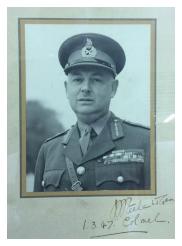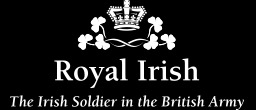Lieutenant General Sir James Steele Addresses the 2nd Inniskillings

|
In the summer of 1944, British manpower shortages had led to the disbandment of the 6th Battalion The Royal Inniskilling Fusiliers, a battalion that had fought with great distinction as part of 38 (Irish) Brigade. Some 320 men were assigned to the Inniskillings’ 2nd Battalion and the 2nd Inniskillings then became part of 38 (Irish) Brigade in July that year. During the last months of the Second World War, the 2nd Inniskillings fought from Taranto in the south, up the entire length of Italy, across the Alps and deep into Austria where the Battalion formed part of the Allied occupying garrison. In the Autumn of 1947, the Battalion was stationed around Villach close to the Austro-Yugoslav border.
On 27 December 1947, the Battalion was visited by the Commander in Chief British Troops and High Commissioner in Austria, Lieutenant General Sir James Steele*. In the picturesque lakeside surroundings of Pörtschach am Wörthersee, General Steele delivered the unwelcome news that the 2nd Inniskillings would be placed into suspended animation as part of the British Army's post-war reorganization. As an Irishman and Colonel Commandant of the Royal Ulster Rifles, General Steele spoke with a deep sympathy for the Inniskillings, paying tribute to the Battalion’s war record and the reputation that it had earned under peace conditions in Austria.
The Colours of the 2nd Battalion were handed over to the Regimental Depot in Omagh for safekeeping and in 1948, the manpower of the two Regular battalions of the Inniskillings merged to continue as the 1st Battalion The Royal Inniskilling Fusiliers. The 2nd Battalion was raised again in 1952 for service in Suez and Cyprus, but was finally disbanded in 1956.
*
General Sir James Stuart Steele GCB KBE DSO MC (26 October 1894 – 24 July 1975) was from Ballycarry, County Antrim and was commissioned into the Royal Irish Rifles serving with that Regiment through the First World War. He later became Adjutant-General, and was Colonel Commandant of The Royal Ulster Rifles.





